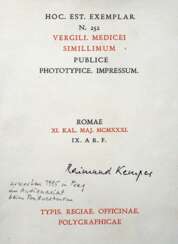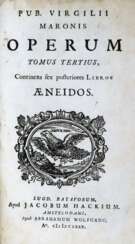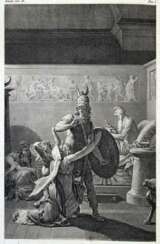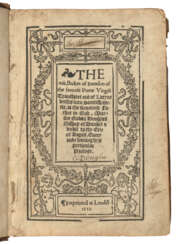Virgil (70 BC - 19 BC) — Auction price
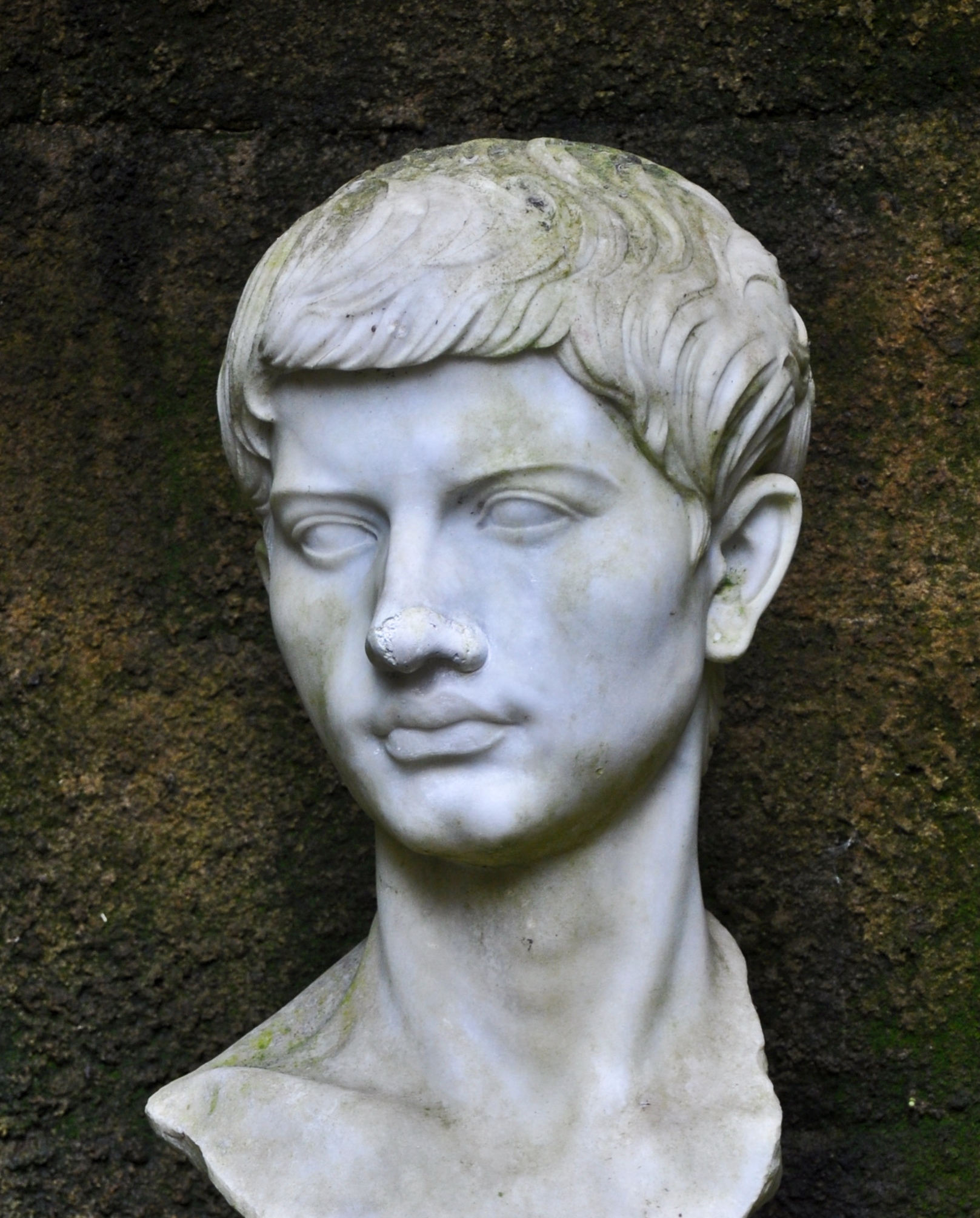
Publius Vergilius Maro, usually called Virgil or Vergil, was an ancient Roman poet of the Augustan period. He composed three of the most famous poems in Latin literature: the Eclogues (or Bucolics), the Georgics, and the epic Aeneid. A number of minor poems, collected in the Appendix Vergiliana, were attributed to him in ancient times, but modern scholars consider his authorship of these poems as dubious.
Virgil's work has had wide and deep influence on Western literature, most notably Dante's Divine Comedy, in which Virgil appears as the author's guide through Hell and Purgatory.
Virgil has been traditionally ranked as one of Rome's greatest poets. His Aeneid is also considered a national epic of ancient Rome, a title held since composition.


Publius Vergilius Maro, usually called Virgil or Vergil, was an ancient Roman poet of the Augustan period. He composed three of the most famous poems in Latin literature: the Eclogues (or Bucolics), the Georgics, and the epic Aeneid. A number of minor poems, collected in the Appendix Vergiliana, were attributed to him in ancient times, but modern scholars consider his authorship of these poems as dubious.
Virgil's work has had wide and deep influence on Western literature, most notably Dante's Divine Comedy, in which Virgil appears as the author's guide through Hell and Purgatory.
Virgil has been traditionally ranked as one of Rome's greatest poets. His Aeneid is also considered a national epic of ancient Rome, a title held since composition.


Publius Vergilius Maro, usually called Virgil or Vergil, was an ancient Roman poet of the Augustan period. He composed three of the most famous poems in Latin literature: the Eclogues (or Bucolics), the Georgics, and the epic Aeneid. A number of minor poems, collected in the Appendix Vergiliana, were attributed to him in ancient times, but modern scholars consider his authorship of these poems as dubious.
Virgil's work has had wide and deep influence on Western literature, most notably Dante's Divine Comedy, in which Virgil appears as the author's guide through Hell and Purgatory.
Virgil has been traditionally ranked as one of Rome's greatest poets. His Aeneid is also considered a national epic of ancient Rome, a title held since composition.
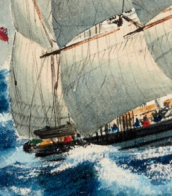

Publius Vergilius Maro, usually called Virgil or Vergil, was an ancient Roman poet of the Augustan period. He composed three of the most famous poems in Latin literature: the Eclogues (or Bucolics), the Georgics, and the epic Aeneid. A number of minor poems, collected in the Appendix Vergiliana, were attributed to him in ancient times, but modern scholars consider his authorship of these poems as dubious.
Virgil's work has had wide and deep influence on Western literature, most notably Dante's Divine Comedy, in which Virgil appears as the author's guide through Hell and Purgatory.
Virgil has been traditionally ranked as one of Rome's greatest poets. His Aeneid is also considered a national epic of ancient Rome, a title held since composition.
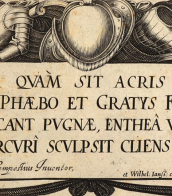

Publius Vergilius Maro, usually called Virgil or Vergil, was an ancient Roman poet of the Augustan period. He composed three of the most famous poems in Latin literature: the Eclogues (or Bucolics), the Georgics, and the epic Aeneid. A number of minor poems, collected in the Appendix Vergiliana, were attributed to him in ancient times, but modern scholars consider his authorship of these poems as dubious.
Virgil's work has had wide and deep influence on Western literature, most notably Dante's Divine Comedy, in which Virgil appears as the author's guide through Hell and Purgatory.
Virgil has been traditionally ranked as one of Rome's greatest poets. His Aeneid is also considered a national epic of ancient Rome, a title held since composition.


Publius Vergilius Maro, usually called Virgil or Vergil, was an ancient Roman poet of the Augustan period. He composed three of the most famous poems in Latin literature: the Eclogues (or Bucolics), the Georgics, and the epic Aeneid. A number of minor poems, collected in the Appendix Vergiliana, were attributed to him in ancient times, but modern scholars consider his authorship of these poems as dubious.
Virgil's work has had wide and deep influence on Western literature, most notably Dante's Divine Comedy, in which Virgil appears as the author's guide through Hell and Purgatory.
Virgil has been traditionally ranked as one of Rome's greatest poets. His Aeneid is also considered a national epic of ancient Rome, a title held since composition.


Publius Vergilius Maro, usually called Virgil or Vergil, was an ancient Roman poet of the Augustan period. He composed three of the most famous poems in Latin literature: the Eclogues (or Bucolics), the Georgics, and the epic Aeneid. A number of minor poems, collected in the Appendix Vergiliana, were attributed to him in ancient times, but modern scholars consider his authorship of these poems as dubious.
Virgil's work has had wide and deep influence on Western literature, most notably Dante's Divine Comedy, in which Virgil appears as the author's guide through Hell and Purgatory.
Virgil has been traditionally ranked as one of Rome's greatest poets. His Aeneid is also considered a national epic of ancient Rome, a title held since composition.
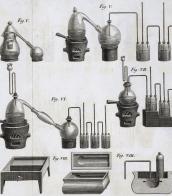

Publius Vergilius Maro, usually called Virgil or Vergil, was an ancient Roman poet of the Augustan period. He composed three of the most famous poems in Latin literature: the Eclogues (or Bucolics), the Georgics, and the epic Aeneid. A number of minor poems, collected in the Appendix Vergiliana, were attributed to him in ancient times, but modern scholars consider his authorship of these poems as dubious.
Virgil's work has had wide and deep influence on Western literature, most notably Dante's Divine Comedy, in which Virgil appears as the author's guide through Hell and Purgatory.
Virgil has been traditionally ranked as one of Rome's greatest poets. His Aeneid is also considered a national epic of ancient Rome, a title held since composition.


Publius Vergilius Maro, usually called Virgil or Vergil, was an ancient Roman poet of the Augustan period. He composed three of the most famous poems in Latin literature: the Eclogues (or Bucolics), the Georgics, and the epic Aeneid. A number of minor poems, collected in the Appendix Vergiliana, were attributed to him in ancient times, but modern scholars consider his authorship of these poems as dubious.
Virgil's work has had wide and deep influence on Western literature, most notably Dante's Divine Comedy, in which Virgil appears as the author's guide through Hell and Purgatory.
Virgil has been traditionally ranked as one of Rome's greatest poets. His Aeneid is also considered a national epic of ancient Rome, a title held since composition.
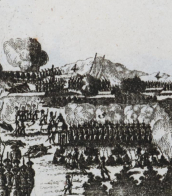

Publius Vergilius Maro, usually called Virgil or Vergil, was an ancient Roman poet of the Augustan period. He composed three of the most famous poems in Latin literature: the Eclogues (or Bucolics), the Georgics, and the epic Aeneid. A number of minor poems, collected in the Appendix Vergiliana, were attributed to him in ancient times, but modern scholars consider his authorship of these poems as dubious.
Virgil's work has had wide and deep influence on Western literature, most notably Dante's Divine Comedy, in which Virgil appears as the author's guide through Hell and Purgatory.
Virgil has been traditionally ranked as one of Rome's greatest poets. His Aeneid is also considered a national epic of ancient Rome, a title held since composition.


Publius Vergilius Maro, usually called Virgil or Vergil, was an ancient Roman poet of the Augustan period. He composed three of the most famous poems in Latin literature: the Eclogues (or Bucolics), the Georgics, and the epic Aeneid. A number of minor poems, collected in the Appendix Vergiliana, were attributed to him in ancient times, but modern scholars consider his authorship of these poems as dubious.
Virgil's work has had wide and deep influence on Western literature, most notably Dante's Divine Comedy, in which Virgil appears as the author's guide through Hell and Purgatory.
Virgil has been traditionally ranked as one of Rome's greatest poets. His Aeneid is also considered a national epic of ancient Rome, a title held since composition.

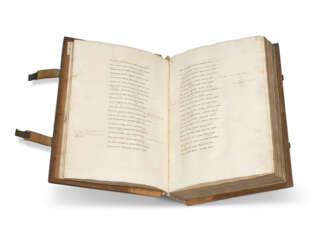

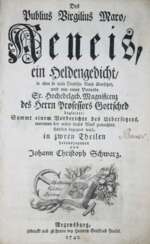

![Georgicks [Bucolicks], translated by John Martyn, 1741-49, 2 vols, colour-printed botanical plates](/assets/image/picture_3102534/1566c/93ld1rooo8m-6xxc1p6kj5b8mzysjwlyj1jgwhjvkpygyo25rfhrdmw4rftj0zxu1694082220jpg__fix_374_244.jpeg)
![Georgicks [Bucolicks], translated by John Martyn, 1741-49, 2 vols, colour-printed botanical plates](https://veryimportantlot.com/assets/image/picture_3102534/1566c/93ld1rooo8m-6xxc1p6kj5b8mzysjwlyj1jgwhjvkpygyo25rfhrdmw4rftj0zxu1694082220jpg__fix_374_244.jpeg)
